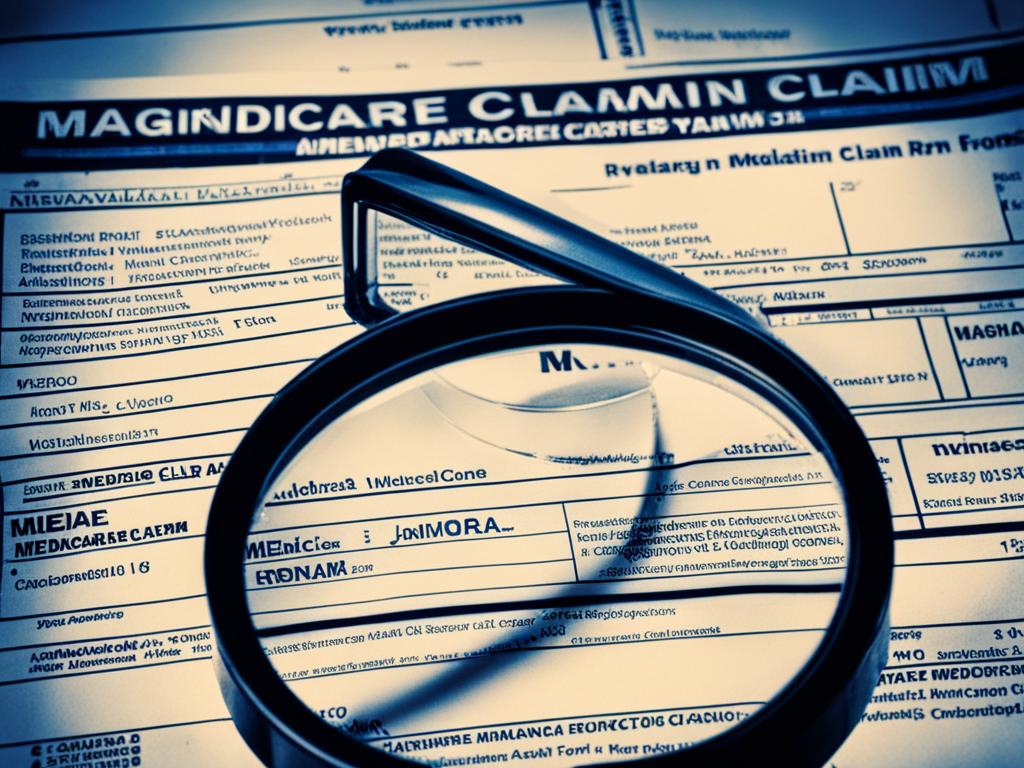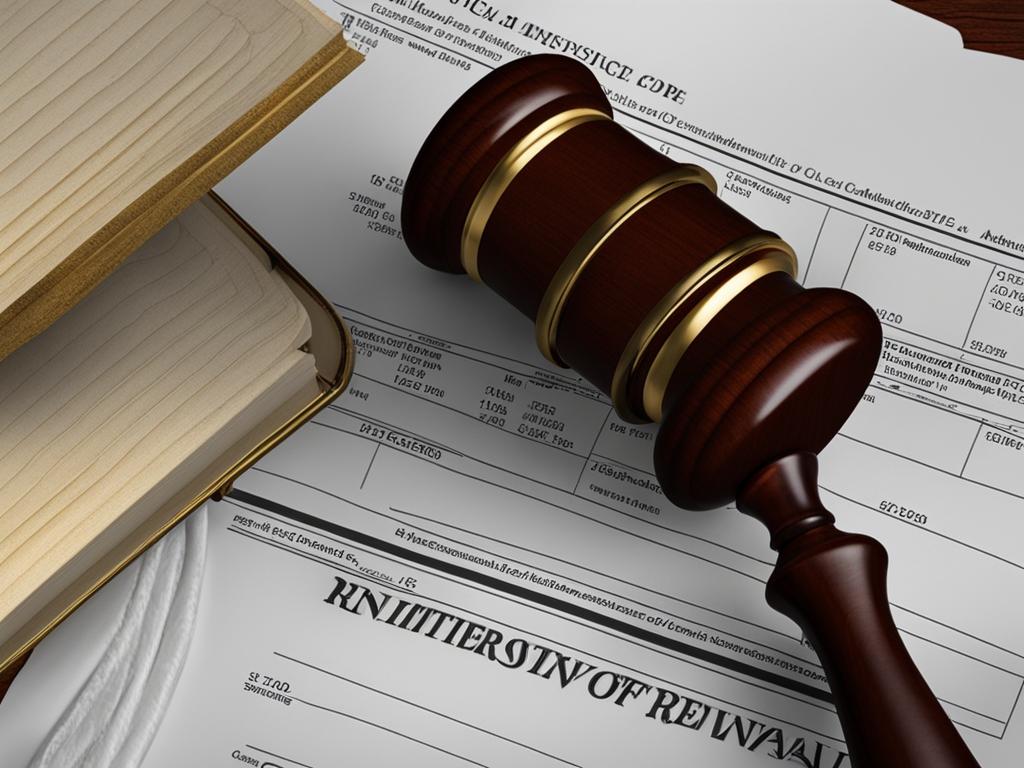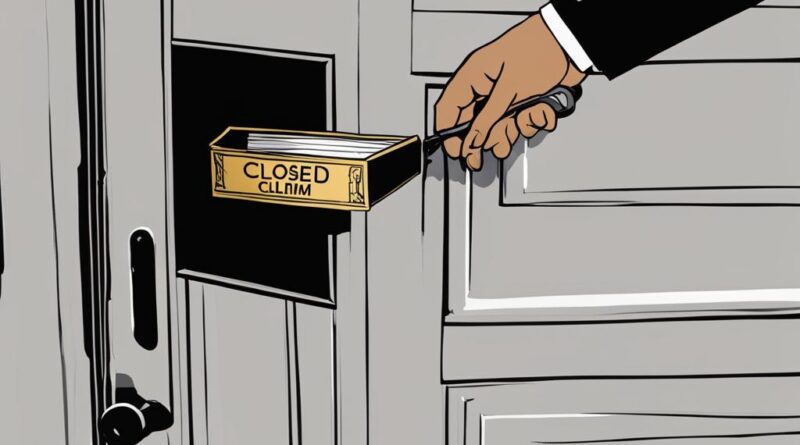Unveiling Truth: Can a Closed Insurance Claim Be Reopened?
In most cases, you cannot reopen a settled car accident claim once you have signed the release form and accepted a settlement. However, consulting a lawyer before accepting a settlement can help ensure that you receive reasonable compensation for your damages. If you have already closed your case, an attorney can still explore options for additional compensation, such as if the insurer engaged in bad faith or multiple parties held fault for your injuries and damages.
Key Takeaways:
- Once you sign a release form and accept a settlement, reopening a closed car accident claim is usually not possible.
- Consulting a lawyer before accepting a settlement can help protect your rights and ensure you receive fair compensation.
- If you believe your claim was wrongfully denied or if new evidence emerges, you may have options to pursue additional compensation.
- Reopening a health insurance claim is generally not allowed, but there may be special enrollment periods for specific circumstances.
- Homeowners insurance claims can sometimes be reopened if there are valid reasons or new evidence.
The Process of Settling a Car Accident Claim
To receive a settlement from the insurance company for a car accident claim, you must sign a release form. By doing so, you give up your legal rights and agree to resolve your case. This means that once you have closed your case by signing the release form, reopening it is usually not an option. It is important to fully understand the extent of your damages and consult a lawyer before accepting a settlement to avoid any future financial hardships.
When settling a car accident claim, it is crucial to have a clear understanding of the process involved. Here is a step-by-step breakdown:
- File a claim: After a car accident, contact your insurance company as soon as possible to report the incident and file a claim.
- Investigation: The insurance company will initiate an investigation to determine liability and assess the damages.
- Evaluation: Once the investigation is complete, the insurance company will evaluate the claim and make a settlement offer.
- Negotiation: You and your lawyer, if you have one, can negotiate with the insurance company to reach a fair settlement amount.
- Signing the release form: If a settlement is agreed upon, you will be required to sign a release form, which legally closes your case and prevents you from reopening it in the future.
- Receiving the settlement: After signing the release form, you will receive the settlement payment.
It is essential to approach the settlement process with caution and seek legal advice to ensure you receive fair compensation for your damages. Remember, once you sign the release form and close your case, reopening it becomes challenging.
Table:
| Step | Description |
|---|---|
| 1 | File a claim |
| 2 | Investigation |
| 3 | Evaluation |
| 4 | Negotiation |
| 5 | Signing the release form |
| 6 | Receiving the settlement |
“When settling a car accident claim, it’s crucial to fully understand the consequences of signing the release form. Once you close your case, reopening it becomes difficult, if not impossible.”
Options if You Settle Your Car Accident Claim Too Soon
If you realize that you settled your car accident claim too soon and have outstanding expenses that the settlement does not cover, reopening your claim is typically not possible. However, you may still have options to pursue additional compensation. If the insurance company acted in bad faith or if multiple parties were involved in the accident, an attorney can review your case and determine if you have grounds for further legal action. Filing a lawsuit against the insurer or the other responsible parties may help you receive the compensation you deserve.
“Settling a claim too soon” can result in accepting a settlement that does not fully cover your damages. In such cases, it is important to consult a lawyer who can assess your situation and explore options for pursuing additional compensation. If the insurance company engaged in bad faith practices, such as denying your claim without valid justification, you may have grounds for a lawsuit. Additionally, if multiple parties were responsible for your injuries and damages, you may be able to hold them accountable and seek further compensation.
Reopening a closed car accident claim may not be possible, but taking legal action against the insurer or the other responsible parties can provide an opportunity to obtain the compensation you rightfully deserve. Consulting with an attorney who specializes in personal injury cases can help you navigate the complex legal process and maximize your chances of a successful outcome. Remember, settling a claim too soon does not mean that you are without options for pursuing additional compensation, and seeking legal advice is crucial to protect your rights and interests.

Table: Possible Options for Pursuing Additional Compensation
| Option | Description |
|---|---|
| Filing a Lawsuit | If the insurance company acted in bad faith or multiple parties were involved, you can file a lawsuit to seek further compensation through the legal system. |
| Proving Bad Faith | If you can demonstrate that the insurer engaged in bad faith practices, such as denying a valid claim without proper justification, you may be able to recover additional damages. |
| Identifying Multiple Parties | If multiple parties were responsible for your injuries and damages, you can pursue legal action against each party to seek compensation for your losses. |
| Consulting an Attorney | Seeking legal advice from a personal injury attorney who specializes in car accident cases can provide you with guidance and representation throughout the process. |
Reopening a Health Insurance Claim
In the United States, reopening a closed health insurance claim is typically not allowed. However, there may be situations where individuals are eligible for a special enrollment period that allows them to obtain health insurance coverage, even if they previously did not have it. One example is the 2021 Special Enrollment Period (SEP) implemented in response to the COVID-19 pandemic. This SEP provided an opportunity for eligible individuals in Illinois without health insurance to enroll in an ACA Health Insurance Marketplace plan between February 15th and May 15th, regardless of the closure of their previous claim.
https://www.youtube.com/watch?v=8X-9GUSPNqc
During the special enrollment period, individuals had a chance to reevaluate their health insurance needs and explore new coverage options. It offered a valuable opportunity for those who may have previously been uninsured or had their claims closed to obtain the necessary health insurance protection.
It is important to note that eligibility for special enrollment periods may vary depending on the circumstances and the specific regulations in place. Therefore, it is advisable to consult with a health insurance professional or visit the official ACA Health Insurance Marketplace website to determine if you are eligible for a special enrollment period to reopen your health insurance claim.
Reopening a Homeowners Insurance Claim
When it comes to homeowners insurance claims, there may be situations where you need to revisit a closed claim. Whether you’ve discovered additional damage or believe that your claim was unfairly denied or underpaid, reopening the claim can provide an opportunity to reevaluate damages and potentially seek further compensation.
One possible scenario for reopening a homeowners insurance claim is if you find new evidence of additional damage that was not included in the initial claim. This could be anything from structural issues to hidden water damage. By reopening the claim and presenting this new evidence to your insurance company, you may be able to request further compensation to cover the cost of repairs or replacements.
If you believe that your claim was unfairly denied or underpaid, filing an appeal with your insurance company is another option. Provide any supporting documentation, such as photos, contractor estimates, or expert opinions, that demonstrate the true extent of the damages. By appealing the decision, you can present your case and argue for a fair and adequate settlement that aligns with your policy coverage.
Table: Steps to Reopen a Homeowners Insurance Claim
| Steps | Description |
|---|---|
| Contact your insurance company | Reach out to your insurance company to inquire about the process for reopening a closed claim. |
| Gather evidence | Collect any new evidence or documentation that supports your request for reopening the claim. |
| File an appeal | If your claim was denied or underpaid, file an appeal with your insurance company, providing all necessary documentation and supporting evidence. |
| Follow up | Stay in contact with your insurance company and follow up on the progress of your claim reopening or appeal. |
Reopening a homeowners insurance claim might require persistence and strong supporting evidence, but it can be a valuable way to seek fair compensation for damages that were initially overlooked or improperly evaluated. By understanding the process and following the necessary steps, you can navigate the reopening process effectively and potentially achieve a more favorable outcome.

Reopening a Car Insurance Claim
If you have unresolved issues with a closed car insurance claim or believe that your claim was wrongfully denied, there are steps you can take to appeal the decision and potentially reopen the claim. Contact your insurance company and express your concerns, providing any additional information or evidence that supports your case. Keep in mind that each insurance company may have different policies and procedures for reopening claims, so it is essential to follow their instructions and provide all necessary documentation.
When appealing a denial, it is important to clearly state the reasons why you believe the decision was incorrect. Provide any relevant documentation or proof that supports your position. Be prepared for the possibility that the insurance company may request additional information or conduct further investigations before making a decision on your appeal.
It is recommended to consult with a lawyer who specializes in insurance claims to guide you through the appeals process and ensure that you are taking the appropriate steps to reopen your car insurance claim. They can provide valuable advice and representation to help you navigate the complexities of insurance policies and regulations.
“By appealing the denial and providing detailed evidence, you can increase the chances of having your car insurance claim reopened and resolved in your favor.”

Table: Key Steps to Reopen a Car Insurance Claim
| Step | Description |
|---|---|
| 1 | Contact your insurance company |
| 2 | Provide additional evidence and documentation |
| 3 | Appeal the denial |
| 4 | Consult with a lawyer |
Reopening a closed car insurance claim may be challenging, but if you have unresolved issues or believe that your claim was wrongfully denied, it is worth pursuing the appeals process. By providing detailed evidence, following the insurance company’s instructions, and seeking legal guidance, you can increase the chances of having your claim reopened and resolved in your favor.
The Medicare Claim Reopening Process
When it comes to Medicare claims, the reopening process is governed by the Medicare Program Integrity Manual. This comprehensive guide outlines the steps taken to verify potential errors and implement corrective actions. Medicare Administrative Contractors (MACs) play a crucial role in conducting prepayment and postpayment reviews to ensure provider compliance with Medicare coverage, coding, and billing rules. These reviews involve a thorough analysis of claims, investigation of supporting documentation, and the identification of any payment errors.
During the review process, MACs may issue Additional Documentation Requests (ADRs) to request additional information or supporting documentation. If errors are identified, corrective actions are taken, which may include recovering overpayments and adjusting claims. The goal of these actions is to minimize future losses to the Medicare Trust Funds and promote accurate billing practices.
“The MACs analyze claims, investigate documentation, and determine if a payment error exists.”
It is essential for providers to ensure accurate and compliant billing practices to avoid potential errors. MACs rely on a variety of documents and guidelines to verify errors, such as progress notes, templates, DMEPOS orders, and medical review guidance. They assess coverage determinations, reasonable and necessary criteria, and coding accuracy to ensure proper reimbursement.
| Benefit | Verification Process |
|---|---|
| Coverage determinations | Assessed based on medical necessity and Medicare guidelines |
| Reasonable and necessary criteria | Evaluated to ensure services are appropriate and meet Medicare requirements |
| Coding accuracy | Reviewed to verify proper coding and billing practices |
MAC articles provide additional guidance for specific services or situations. When policies and guidelines are not available, claims are reviewed based on standard principles. Providers have the opportunity to respond to ADRs and provide the requested information for review. Reopening a claim may occur when additional information is received or if a claim was denied due to late or insufficient submission of requested information.

Verifying Potential Errors and Taking Corrective Actions
The Medicare claim reopening process involves thorough verification of potential errors and taking appropriate corrective actions. MACs, along with the Certification, Review, and Education contractor (CERT) and Recovery Auditors, have the authority to implement corrective actions. These actions may include provider notification and feedback, comparative billing reports, and evaluations of the effectiveness of established automated edits.
By following these guidelines and engaging in the Medicare claim reopening process, providers can work towards achieving accurate billing practices and ensuring compliance with Medicare rules. The ultimate goal is to minimize potential losses to the Medicare Trust Funds while providing beneficiaries with access to quality healthcare services.
Verifying Errors in Medicare Claims
When it comes to Medicare claims, verifying errors is a crucial step in ensuring accurate billing and compliance with Medicare rules. This process involves thorough review and analysis of various documents and guidelines by Medicare Administrative Contractors (MACs), including progress notes, templates, and medical review guidance. MACs assess coverage determinations, reasonable and necessary criteria, coding accuracy, and documentation integrity. They also examine specific guidelines for therapy services and psychotherapy notes, if applicable. This meticulous verification process aims to identify any errors or discrepancies that may exist within the Medicare claims.
MACs conduct the verification process based on standard review principles, utilizing available policies and guidelines. In cases where policies and guidelines are not readily available, claims are reviewed using established review principles. The objective is to ensure that claims are thoroughly evaluated and accurately reflect the provided services, adhering to the reasonable and necessary criteria set forth by Medicare. By verifying errors in Medicare claims, MACs play a vital role in maintaining the integrity of the Medicare program and promoting accurate billing practices.
To provide additional guidance and insights, MAC articles offer further information on specific review topics and processes. These articles serve as valuable resources for healthcare providers, assisting them in navigating the complex landscape of Medicare claims and compliance. By staying informed about the latest MAC articles and updates, providers can enhance their understanding of Medicare requirements and optimize their billing practices to ensure compliance with Medicare rules.

The Importance of Coverage Determinations and Reasonable and Necessary Criteria
One key aspect of verifying errors in Medicare claims is the assessment of coverage determinations and the application of reasonable and necessary criteria. Medicare coverage determinations outline the medical services and procedures that are eligible for coverage under the program. It is crucial for healthcare providers to accurately interpret and apply these coverage determinations to ensure that their claims align with Medicare’s guidelines.
The reasonable and necessary criteria provide further guidance on the medical necessity of services and the conditions that must be met for coverage. MACs evaluate whether the services rendered meet the reasonable and necessary criteria, ensuring that they are appropriate and essential for the patient’s diagnosis or treatment. By carefully examining coverage determinations and applying the reasonable and necessary criteria, MACs can identify potential errors or discrepancies in Medicare claims and take appropriate corrective action.
The verification of errors in Medicare claims plays a vital role in promoting accurate billing practices and preventing fraudulent activities within the healthcare system. By ensuring that claims accurately reflect the provided services and adhere to Medicare’s guidelines, MACs contribute to the overall integrity and sustainability of the Medicare program.
Prepayment and Postpayment Medical Record Reviews
When it comes to Medicare claims, both prepayment and postpayment medical record reviews play a crucial role in ensuring accurate billing and compliance with Medicare rules. These reviews are conducted by Medicare Administrative Contractors (MACs) to verify the validity of claims and determine if any errors exist.
In the prepayment review process, MACs may issue Additional Documentation Requests (ADRs) to request additional information or supporting documentation. These requests help MACs assess the accuracy and appropriateness of the services billed before making payment decisions.
“Prepayment reviews are conducted to minimize improper payments and ensure that services submitted for payment meet Medicare’s coverage, coding, and billing rules.” – Medicare Program Integrity Manual
On the other hand, postpayment reviews involve evaluating claims after they have been paid. MACs analyze the documentation submitted by providers to determine if any errors were made during the billing process. If errors are identified, the MACs can reopen the claim and take corrective action.
Evaluating the Effectiveness of Corrective Actions
When a claim is reopened as a result of a postpayment review, MACs and other auditing entities, such as Recovery Auditors and the Comprehensive Error Rate Testing (CERT) program, take corrective actions to address the identified errors. These actions are designed to correct billing behavior, prevent future inappropriate billing, and ensure compliance with Medicare rules.
One important aspect of the corrective action process is evaluating the effectiveness of the established automated edits. Comparative billing reports, provider notifications, and feedback are some of the tools used to gauge the impact of the corrective actions taken. By assessing the effectiveness of these measures, Medicare aims to minimize potential losses to the Medicare Trust Funds and promote accurate billing practices.
In conclusion, prepayment and postpayment medical record reviews are integral to the Medicare claims process. They help identify potential errors, request additional documentation if needed, and take corrective actions to ensure compliance and accurate billing. By understanding these reviews, providers can navigate the Medicare system more effectively and help maintain the integrity of the program.
Corrective Actions in Medicare Claims Review
When it comes to reviewing Medicare claims, the goal is to ensure accurate billing practices and minimize potential losses to the Medicare Trust Funds. In this process, various entities, such as MACs, CERT, and Recovery Auditors, have the authority to take corrective actions in response to identified errors. These actions are aimed at correcting billing behavior, preventing future inappropriate billing, and promoting compliance with Medicare rules.
One approach to corrective actions is progressive action, which involves notifying and providing feedback to healthcare providers. This proactive method helps educate providers about billing errors, allowing them to make necessary adjustments and improve their billing practices. Comparative billing reports are also utilized to evaluate the effectiveness of established automated edits, further enhancing the accuracy of Medicare claims.
Evaluating the effectiveness of corrective actions is crucial to ensure ongoing compliance and efficiency. By regularly assessing the impact of implemented measures, Medicare can identify areas for improvement and refine its strategies. This evaluation process helps to fine-tune billing guidelines, reduce billing errors, and safeguard the integrity of the Medicare program.
| Corrective Actions in Medicare Claims Review |
|---|
| Progressive Corrective Action |
| Evaluating Effectiveness |
With a commitment to accuracy and transparency, Medicare continually strives to optimize its claims review process. By implementing corrective actions, evaluating their effectiveness, and engaging with healthcare providers, Medicare aims to maintain the integrity of the program and ensure that beneficiaries receive appropriate and necessary care.
Administrative Relief and Appeals in Medicare Claims Review
When it comes to navigating the complex world of Medicare claims, providers may encounter situations where administrative relief and appeals become necessary. Administrative relief options are designed to provide flexibility in medical review processes during challenging circumstances, allowing providers to request relief from certain requirements. While these options offer some respite, it is crucial to remember that compliance with Medicare rules and regulations remains essential.
If a provider disagrees with a medical review decision, they have the right to appeal and defend their case. Administrative Law Judge (ALJ) hearings provide the platform for presenting arguments and presenting evidence to support their position. It is important for providers to thoroughly prepare for the hearing, gathering all relevant documentation, and ensuring a persuasive and compelling defense.
Prior authorization programs may also be implemented for certain services as a way to ensure appropriate coverage, coding, and billing. These programs require providers to obtain approval from Medicare before performing specific procedures or offering certain treatments. By adhering to the prior authorization process, providers can avoid claim denials and potential reimbursement issues.
| Administrative Relief and Appeals in Medicare Claims Review | Defending Medical Review Decisions | Prior Authorization |
|---|---|---|
| Offers flexibility during challenging circumstances | Allows providers to appeal and defend their case | Ensures appropriate coverage, coding, and billing |
| Compliance with Medicare rules remains essential | ALJ hearings provide an opportunity to present arguments and evidence | Requires approval from Medicare before performing certain services |
| Thorough preparation and documentation are crucial for a compelling defense | Helps avoid claim denials and reimbursement issues |
By understanding and utilizing administrative relief options, defending medical review decisions at ALJ hearings, and following prior authorization requirements, providers can navigate the Medicare claims review process effectively. It is essential to stay updated on the latest Medicare guidelines and regulations to maintain compliance and ensure successful claims reimbursement.

Key Takeaways:
- Administrative relief options offer flexibility in medical review processes during challenging circumstances.
- Providers have the right to appeal and defend their case at Administrative Law Judge (ALJ) hearings.
- Prior authorization programs ensure appropriate coverage, coding, and billing for certain services.
- Compliance with Medicare rules and regulations is crucial for successful claims reimbursement.
By utilizing these strategies, providers can effectively navigate the Medicare claims review process and ensure proper reimbursement for their services.
Conclusion
When it comes to closed insurance claims, navigating the process of reopening can be challenging. However, it is crucial to explore all available options if you believe your claim was wrongfully denied or if you have new evidence to support your case. Consulting with a lawyer who specializes in insurance claims can provide valuable guidance and ensure you understand the rules and regulations applicable to your specific situation.
It’s important to remember that different types of insurance claims have their own unique processes and requirements. Whether you’re dealing with a car accident claim, health insurance claim, homeowners insurance claim, or car insurance claim, understanding the specific rules and regulations will help you navigate the process effectively.
Exploring your options is essential. This may include considering eligibility for special enrollment periods, appealing decisions, or seeking additional compensation in certain circumstances. By taking a proactive approach and being well-informed, you can increase your chances of achieving a favorable outcome and receiving the compensation you deserve.
FAQ
Can I reopen a settled car accident claim once I have signed the release form and accepted a settlement?
In most cases, reopening a settled car accident claim is not possible once the release form has been signed and the settlement has been accepted. It is important to consult a lawyer before accepting a settlement to ensure you receive reasonable compensation.
What can I do if I realize I settled my car accident claim too soon and have outstanding expenses?
If you settled your car accident claim too soon and have outstanding expenses that the settlement does not cover, reopening the claim is typically not an option. However, consulting a lawyer can help determine if there are grounds for further legal action, such as bad faith by the insurer or shared fault among multiple parties.
Is it possible to reopen a closed health insurance claim?
Generally, reopening a closed health insurance claim is not allowed. However, there may be special enrollment periods available in certain circumstances, such as during a disaster or pandemic, which allow for enrollment in health insurance plans.
Can I reopen a homeowners insurance claim?
There are situations where a homeowners insurance claim can be reopened, such as when there is new evidence or additional damages not included in the initial claim. Additionally, if a claim was unfairly denied or underpaid, filing an appeal with the insurance company can be an option.
How can I reopen a closed car insurance claim?
Reopening a closed car insurance claim can be challenging, but it is not impossible. If you believe your claim was wrongfully denied or have unresolved issues, you can appeal the decision and provide any additional information or evidence that supports your case. Each insurance company may have different policies and procedures, so it is important to follow their instructions.
What is the process for verifying potential errors and taking corrective actions with Medicare claims?
Medicare claims undergo prepayment and postpayment reviews conducted by Medicare Administrative Contractors (MACs) to ensure compliance with Medicare coverage, coding, and billing rules. These reviews involve analyzing claims, investigating documentation, and identifying any payment errors. Corrective actions may be taken to recover overpayments and adjust claims.
How do MACs verify errors in Medicare claims?
MACs use various documents and guidelines, such as progress notes, templates, and medical review guidance, to verify errors in Medicare claims. They assess coverage determinations, reasonable and necessary criteria, and coding accuracy. MAC articles provide additional guidance, and claims are reviewed based on standard principles when policies and guidelines are not available.
What are prepayment and postpayment medical record reviews?
Prepayment and postpayment medical record reviews are conducted by Medicare to ensure accurate billing and compliance with Medicare rules. During these reviews, Additional Documentation Requests (ADRs) may be issued to request more information or supporting documentation. If errors are identified during postpayment reviews, a claim may be reopened for further evaluation and corrective action.
How are corrective actions taken in response to identified errors in Medicare claims?
Medicare Administrative Contractors (MACs), CERT (Comprehensive Error Rate Testing), and Recovery Auditors have the authority to take corrective actions in response to identified errors in Medicare claims. These actions may include progressive measures such as provider notification and feedback, comparative billing reports, and evaluations of the effectiveness of automated edits.
Is there administrative relief and a process for appeals in Medicare claims review?
Medicare offers administrative relief options during disasters and allows for flexibility in medical review processes. Providers have the right to appeal medical review decisions and defend their case at Administrative Law Judge (ALJ) hearings. Prior authorization programs may also be implemented for certain services to ensure appropriate coverage, coding, and billing.
Can a closed insurance claim be reopened?
Reopening a closed insurance claim can be challenging, but it is important to explore all available options if you believe your claim was wrongfully denied or if you have new evidence to support your case. Consulting with a lawyer and understanding the applicable rules and regulations can help navigate the process effectively.

